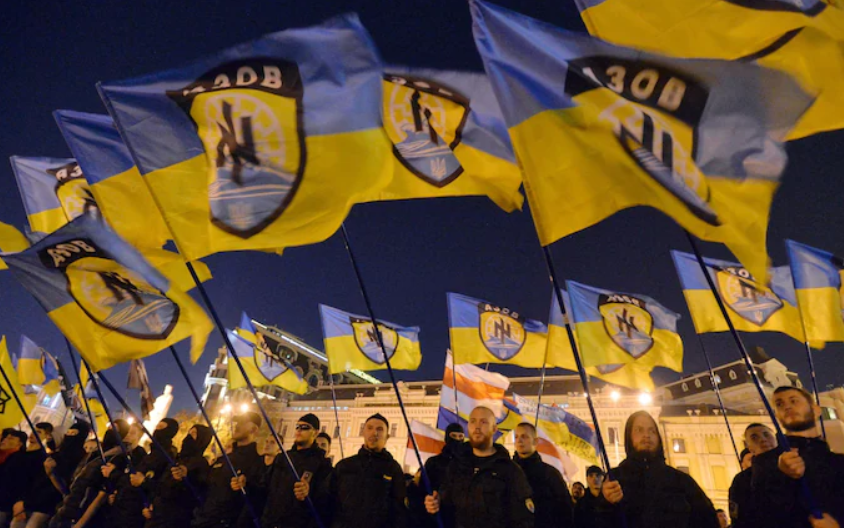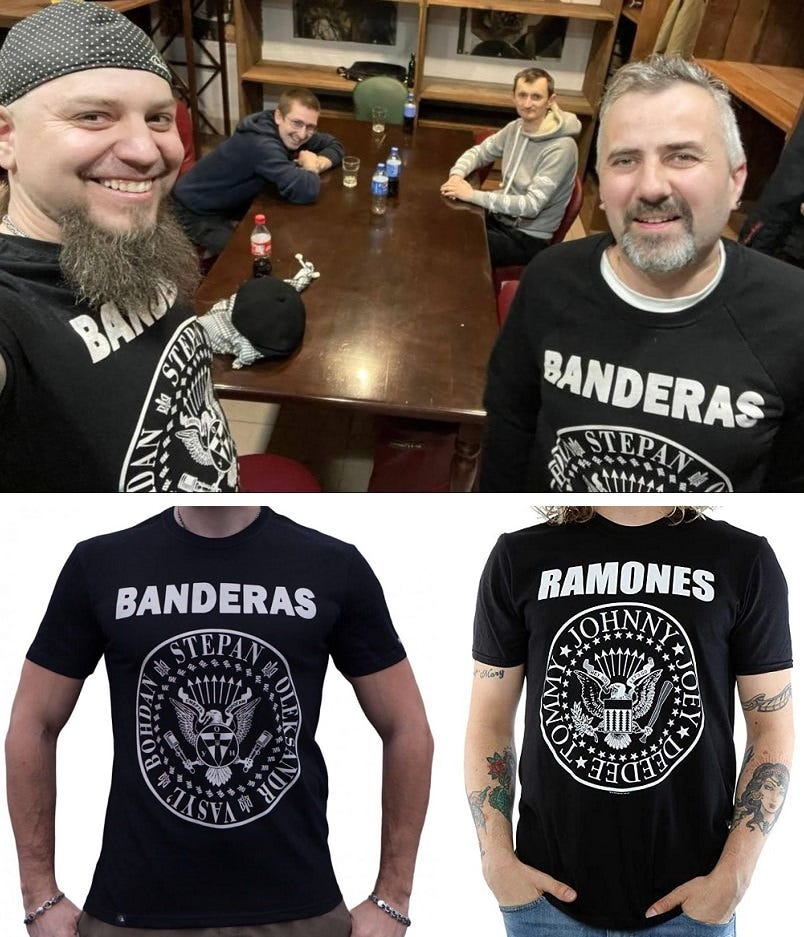Confusion over the Ukrainian far right: Billy Bragg and the Banderite band
There was a time when the mainstream media were prepared to report accurately and in some detail on the disturbing far-right aspects of post-Maidan politics in Ukraine. These days, not so much. Such journalism would undermine the propaganda image of a small democratic country defying the might of a dictatorial neighbour in defence of political freedom. It might even lead people to conclude that Vladimir Putin’s claim that Ukraine is in need of “denazification” is not quite as deluded as Western commentators make it out to be.
For example, news coverage of the horrific destruction inflicted on the city of Mariupol by Russian attacks is regularly accompanied by accolades to the city’s defenders. “When this is all over one suspects they’ll be making Hollywood films about Mariupol”, Sky News security analyst Michael Clarke gushed. Less attention is paid to the fact that a major component of the defending forces in Mariupol is the neo-Nazi Azov regiment. It would certainly be interesting to see how a Hollywood movie dealt with that. I suppose those Wolfsangel banners, and Sonnenrad and Totenkopf symbols, could be quite cinematic. But even the most talented scriptwriter would have difficulty depicting the fascist paramilitaries of Azov as engaged in a struggle to defend democratic liberties.

Failure to interrogate the far-right ideology that pervades ethnocentric Ukrainian nationalism was again in evidence recently, after a Ukrainian rock band named Beton released their rather leaden version of the Clash song London Calling. Retitled Kyiv Calling, it features new lyrics hailing armed resistance to the Russian invasion, albeit not entirely coherently. “Kyiv calling, we ain’t got the planes, so clear our skies, stop the rockets of pain” they sing, which sounds as though they’re repeating Volodymyr Zelensky’s thankfully futile appeal to NATO to impose a no fly zone and risk provoking World War 3. However this is followed by “Kyiv calling to the NATO zone, forget it brother, we can go it alone”, which suggests that Ukraine has no need of Western military intervention anyway. But then, nationalist bombast and rational argument rarely go together.
The story of Kyiv Calling was enthusiastically promoted by mainstream news outlets, providing the sort of international publicity that an obscure band like Beton could previously only have dreamed of. The Observer ran a puff piece by Vanessa Thorpe reporting that the new recording had been approved by surviving members of the Clash, with the funds raised going to an organisation called the Free Ukraine Resistance Movement. This outfit was described by band member Andriy Zholob as “a citizen-led network of thousands of people from across many professions, linking more than 30 organisations throughout Ukraine”, whose mission is to “restore territorial integrity and strengthen Ukraine’s sovereignty, building for a future as an EU and Nato member country”.
What were the origins of the Kyiv Calling stunt? Did Beton themselves come up with the idea of recording a reinterpretation of a Clash classic adapted to supporting the patriotic war effort? It would appear not. In a Facebook post the band has stated that it was one Ostap Kryvdyk of the Capitulation Resistance Movement who approached them and proposed that they record a new version of London Calling in which the song would be “reborn as a call to arms”. So who are Kryvdyk and the CRM?
For five years Kryvdyk was employed as an adviser to the former speaker of the Ukrainian parliament Andriy Parubiy. Which sounds eminently respectable as long as you know nothing of Parubiy’s political history. As Lev Golinkin noted in an informative 2019 article on the danger posed by the Ukrainian far right, Parubiy is in fact a veteran of the country’s fascist movement, having “cofounded and led two neo-Nazi organizations: the Social-National Party of Ukraine (later renamed Svoboda), and Patriot of Ukraine, whose members would eventually form the core of Azov”. Parubiy later decided that his political agenda could be pursued more effectively through mainstream parties, but there is no indication that he broke with extreme rightwing nationalism. Another useful article from 2019, by Jonathan Brunson, argued that Parubiy “typifies the normalization of the far right” in Ukrainian politics. This is the man Ostap Kryvdyk worked for.
As for the Capitulation Resistance Movement it was formed in October 2019 as part of a nationalist backlash against Zelensky when he tried to carry out his election promise to bring an end to the war in Donbass. Accused of treachery after agreeing to the Steinmeier formula as a basis for implementing the Minsk accords, which would have allowed elections in Donetsk and Lugansk to a regional government with devolved powers, Zelensky was confronted by furious protests and threats of violence. Azov and other far-rightists predictably played a leading role in all this. Faced with the prospect of suffering the same fate as Viktor Yanukovych, who was deposed from the presidency in 2014 and forced to flee the country following threats from the far right, Zelensky failed to negotiate a settlement conceding special status for Donbass, and the Minsk accords remained a dead letter.
Which brings us to the Free Ukraine Resistance Movement that Kyiv Calling is helping to fund. It turns out that this is just the CRM under a new name, as the FURM website admits. (“During 2019–2022, named that time the ‘Capitulation Resistance Movement’, we’ve organised 20+ Nation wide street protests and resisted Ukraine accepting the Steinmeier formula and Minsk Agreements.”) Presumably the rebrand was considered helpful in attracting support from foreign donors, who might otherwise have hesitated to back the CRM, given its record of hostility towards the now universally revered Zelensky, who it once regarded as a traitor guilty of selling out Ukraine to the Russians.

The political philosophy of the CRM/Free Ukraine Resistance Movement (more on which here) can be gauged by photos that appear on their site of various demonstrations they have organised. Alongside the blue and yellow of the Ukrainian national flag you can see red and black flags too. This was the banner of the Ukrainian Insurgent Army (UPA), the military arm of Stepan Bandera’s faction in the Organization of Ukrainian Nationalists (OUN). As I pointed out in a previous article, Bandera was a Nazi collaborator who wanted to establish an ethnically pure Ukrainian nation state from which Jews, Poles and Russians had been eradicated. In line with this objective, his supporters assisted the Nazis in carrying out the Holocaust in Ukraine. In 1943–44 the UPA also committed genocide against Poles, up to a hundred thousand of whom were killed, victims of the Banderites’ fascistic conception of Ukrainian national liberation.
One prominent figure to buy into the heartwarming tale of a Ukranian rock band raising funds for a patriotic cause was leftwing musician Billy Bragg, who on 19 March publicised Kyiv Calling on his Facebook page. Unlike Billy, some of his followers took the trouble to check Beton’s own Facebook page, and found a picture of the band wearing t-shirts that imitated a famous design featuring US punk band the Ramones, but with their names replaced by those of Stepan Bandera and his three brothers.

Further research reveals that the offending t-shirts were produced by a Lviv-based company called GWear, which makes a specialty of clothing displaying rightwing nationalist imagery. In addition to the Banderas t-shirt, they sell one celebrating Stepan Bandera himself, another dedicated to his fellow Nazi collaborator, UPA commander Roman Shukhevych, and many more with similar nationalist themes. It’s difficult to believe that Beton were ignorant of the provenance of their shirts.
To be fair, once he was made aware of this issue Billy Bragg did take down the original Facebook post promoting Kyiv Calling. As he explained in a follow-up post on 20 March: “Stepan Bandera was a far-right Ukranian politician who collaborated with the Nazis during the occupation of Ukraine and whose followers were complicit in the Holocaust.” He pointed out that, while it was possible to argue over what the response of the late Joe Strummer would have been to Beton’s rewrite of London Calling, “we can be damn sure that he would not have allowed his song to be utilised by a band that expressed their support for fascists”.
Regrettably, though, that wasn’t the end of it. Two days later, following a discussion with Andriy Zholob, Billy announced another U-turn. Beton’s lead guitarist was, he wrote, “understandably concerned by my criticism” and had “asked me to help craft a statement that both apologised for the offence caused by the shirts and clarified the band’s position”. This was followed by the text of Beton’s statement, which concluded with the slogan “Slava Ukraini!” — “Glory to Ukraine!”, the rallying cry of Bandera’s OUN, the adoption of which by the Ukrainian armed forces in 2018 at the instigation of then president Petro Poroshenko was a further demonstration of the absorption of Banderism into the political mainstream.

Although Beton had removed the photo featuring the Banderas t-shirts from their Facebook page, this was not because they accepted they were wrong to celebrate a genocidal fascist. Rather, they argued, the problem had arisen from the fact that “perceptions of Bandera around the world are different from those held by many Ukrainians”. The most Beton was prepared to concede was that Bandera was “a very controversial figure”.
Their statement went on to give this misleading summary of Bandera’s relations with the Nazi regime: “Bandera’s passion for Ukrainian independence led him to both collaborate with the Nazis and then turn against them when they tried to suppress the country. During the most troubling period in our nation’s history, Bandera was sent to a concentration camp for resisting the Nazis.” The reality is that Bandera came into conflict with the Nazis over his call for the establishment of a pro-Nazi ethnonationalist Ukrainian state. Although some figures in the Nazi Party were prepared to consider the idea that German rule over Ukraine should be exercised through an OUN puppet government, Hitler rejected this, and as a result in 1941 Bandera was imprisoned. He was released in 1944 so that he could provide assistance to Nazi Germany in fighting the advancing Soviet forces.
The Beton statement also entirely failed to take a stand against the OUN’s role in the Holocaust. Instead, echoing the evasions of Holocaust deniers, it argued that such questions should be up for debate.
It’s not just a matter of Beton’s historical revisionism and contemptible choice of t-shirts, though. No less objectionable is its support for the Bandera-inspired rightwing nationalists of the Capitulation Resistance Movement, who have pushed the line that there can be no compromise over Donbass and denounced as traitors anyone who advocates a peaceful settlement of the issue. Their preference was and still is to crush the Donetsk and Lugansk people’s republics by military force and reimpose central government control — or “restore territorial integrity and strengthen Ukraine’s sovereignty”, as Andriy Zholob puts it. Such hardliners not only bear part of the responsibility for provoking this appalling war, but they also present a serious obstacle to ending it. It goes without saying that these are not political forces whose fundraising initiatives should be supported by anyone on the left.
First published on Medium in March 2022